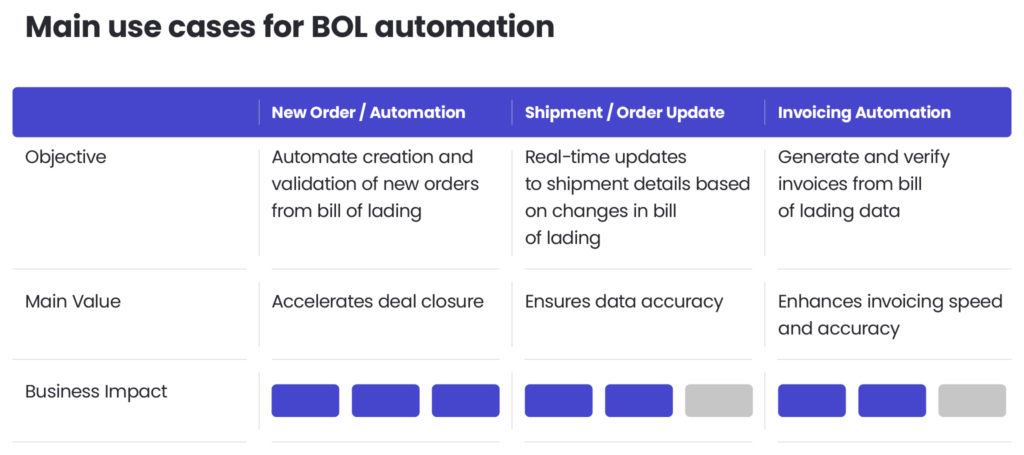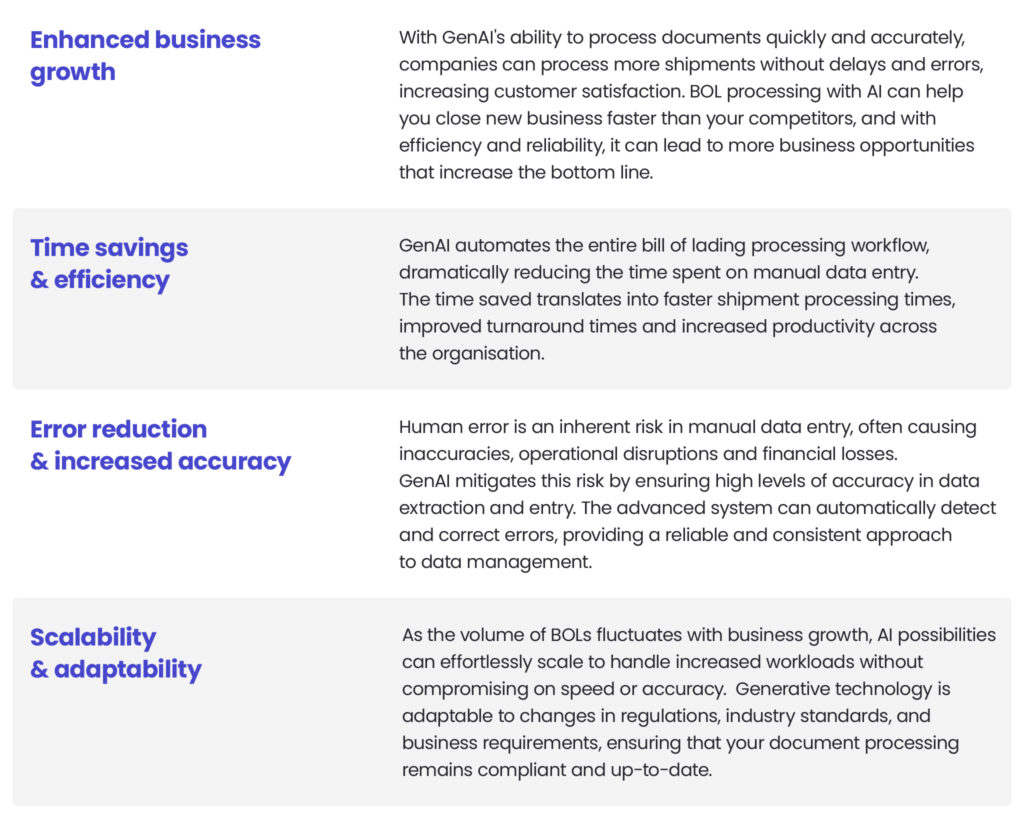Bill of Lading: automatic GenAI processing
In the logistics industry, bill of lading processing is a time-consuming task that can drain resources and impact business efficiency.
Whether you are dedicating countless hours of your employees’ time to manual data entry or outsourcing the work overseas at a significant cost, the traditional methods are far from ideal. The constant risk of mistakes, misplaced documents, and operational delays adds to the frustration and financial burden, leaving companies searching for a better solution.
According to a survey by the Council of Supply Chain Management Professionals, document management is a top concern for third party logistics, with 59% of respondents citing it as a challenge.
Let’s take a look at the generative AI and its potential to revolutionise BOL management providing an in-depth look at the benefits and implementation of this innovative approach.
The importance of accurate bill of lading management
The bill of lading is a fundamental document in international trade logistics. It links various stakeholders in the supply chain and fulfills several vital functions, for examples: it acts as a receipt for shipped goods, a document of title, and a contract of carriage between the shipper and the carrier. Ensuring the accuracy and integrity of the BOL is crucial, as even minor errors can lead to significant operational disruptions and financial losses.
For carriers, an accurate BOL guarantees the efficient and dispute-free transport of goods, minimising the risk of claims and legal issues. Insurers depend on these documents to assess risks accurately and validate claims, maintaining the financial stability of shipping operations. Customs agencies utilise the BOL to verify the legitimacy and compliance of shipments, which is essential for preventing fraud and ensuring security. Seaports and air cargo facilities rely on them for the orderly processing and handling of goods, facilitating seamless transitions through these logistics’ hubs. Production companies managing their own logistics need accurate BOLs to synchronise their supply chains, maintain optimal inventory levels, and meet delivery schedules.

The current challenges in BOL processing
Every day you receive dozens of bills of lading via email. Each document must be painstakingly entered into your system manually. Throughout this process, there is a constant fear of misplacing a document, which can result in lost business opportunities. The errors made during manual data entry must be caught and corrected before they escalate into major problems when the goods are received.
As you can see, the process of handling bills of lading in the logistics industry is fraught with challenges that can impact your bottom line. At present, the most burdensome tasks facing organisations today are:
Problems with manual processing
Manual entry of data is inherently slow and labour intensive. Employees must meticulously enter each detail, which is tedious as well as highly inefficient. It consumes valuable time that could be better spent on more strategic tasks.
Risk of losing documents
With each document arriving by email and then being processed manually, there is a risk of BOL being lost or misfiled. Such losses can cause customers to seek alternative suppliers, and the slower you process these lists, the more business you lose.
Data entry errors
Human error is an inevitable aspect of manual data entry. Even the most diligent employees can make mistakes that result in incorrect information being recorded. They can cause delays, disputes and financial losses, especially if the mistakes are not discovered until the goods reach their destination.
Time-consuming processes
The sheer volume of BOLs that need to be processed each day makes the task extremely time-consuming. This significant time investment detracts from the overall productivity of the organisation, causing delays in other critical operations.
The cumulative effect of manual processing, the risk of lost documents and data entry errors significantly increases the potential for costly mistakes and operational inefficiencies. These challenges increase operational costs and undermine customer satisfaction and corporate reputation.
How the adaption of generative AI transforms automatic bill of lading
Implementing generative artificial Intelligence streamlines the bill of lading process from start to finish by automating tasks that were previously tedious. With GenAI, the process begins as soon as a BOL email is received, requiring no manual intervention to initiate. Advanced algorithms identify and extract all relevant information from the BOL, such as shipment details, consignee information and cargo specifications. This eliminates the need for manual data entry, dramatically reducing the time and effort required to process each document. By upgrading your system with AI, you will be able to handle a large number of BOLs, ensuring that no document is missed, and all data is captured accurately.
Once extracted, the data is seamlessly integrated into your existing logistics management system. This means that all relevant information is immediately available in your system. As changes occur, such as changes to shipping schedules or delivery addresses, the AI system automatically updates the data in real time, ensuring that it is always up to date and reducing the likelihood of operational errors and delays. It also provides instant access to accurate information, critical for making informed decisions and maintaining efficient logistics operations.
Manual bill of lading processing is inherently prone to human error, which can lead to costly mistakes and operational inefficiencies. GenAI solves these problems by maintaining consistency in data processing. The system’s error detection and correction capabilities ensure that any discrepancies or anomalies are quickly identified and resolved, while maintaining high data quality standards. For example, AI can compare data against pre-defined policies and historical records to detect inconsistencies and flag potential problems before they escalate.
Schedule a demo to see how our AI-based solution can transform logistics operations.
Find out moreBenefits of GenAI automatic processing
Generative AI in bill of lading processing delivers benefits that significantly improve business operations and outcomes in the shipping industry. Firstly, financially, reducing manual work and associated errors leads to cost savings and improved margins. And secondly, it ensures accurate and timely data entry, helping to avoid issues that could disrupt the supply chain.

Discover the successful implementation of Gen AI for bill of lading processing
Our client, a logistics company based in the US, needed to build and implement an automated system to process pickup orders. The goal was to achieve full automation in the order pickup and confirmation processes. The company was handling a high volume of 600 emails per day, from which up to 24 different fields of information needed to be accurately extracted. The key business needs included achieving a 98% accuracy rate in information extraction and reducing the processing time, as current delays were causing some orders to take over 48 hours to process, resulting in customer loss.
We were responsible for developing and implementing an AI model capable of understanding and extracting data from various email formats. Alongside that, we were also focused on performance monitoring to ensure the AI system met the accuracy rate in its early stages, with continuous improvements made based on feedback to enhance the AI model’s efficiency and reliability.
Over to you
Experience firsthand the AI solution that autonomously reads BOLs from your email accurately enters your data into the system and continuously monitors and updates this information in real time as changes occur.
To get started, fill out the form below and take the first step towards optimising your BOL management!
About the author
contact us




